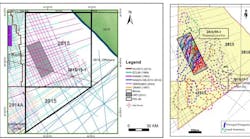When the U.S. Navy converted from coal burning to oil burning ships before World War I, the government set aside three oil fields as Naval Petroleum Reserves.
The reason: fear that the nation would shortly run out of oil.
Not many people have heard of the Elk Hills and Buena Vista NPRs in California. But most have heard of Teapot Dome in Wyoming because it lent its name to the most famous of the Harding administration's scandals.
How it developed
In 1922, President Harding's interior secretary, Albert Fall, wrested control of the NPRs from the Navy, then gave oilmen noncompetitive leases to develop Elk Hills and Teapot Dome.
It soon was discovered that Fall had been bribed. He and oilman Harry Sinclair later went to prison, and the NPRs went back to Navy control.
Charles DiBona, president of the American Petroleum Institute, got interested in Teapot Dome when he was deputy director of the White House energy policy office during the 1973 oil crisis.
He and his coworkers were grasping for ways to increase U.S. oil production, and unlocking the NPRs was an obvious solution.
But they discovered a formidable, hidden roadblock.
Rep. Edward Herbert (D-La.), at that time chairman of the House armed services committee, which had jurisdiction over the NPRs, told them that upon becoming chairman he had pledged to his predecessor that the NPRs would never be leased to oil companies.
It seemed that his predecessor had been required to make the same pledge, and so forth.
The legacy was traced back to a congressman who had been so incensed over the Teapot Dome scandal he had extracted the initial promise and required it to be handed down like a chain letter from chairman to chairman.
DiBona's office discovered that the congressman was still alive, and some White House officials were dispatched, hats in hand, to ask him to lift the curse.
The old man considered their plea but told them he didn't consider the 1973 oil shortage serious enough to justify using the Navy's oil reserve. So it remained in the ground.
Enter DOE
In 1976, Congress created the Department of Energy and shifted control of the NPRs to it.
Elk Hills field, in which Chevron Corp. holds a 22% interest, has been on production for years.
This month Congress is expected to act on legislation to sell the federal share of Elk Hills and study options for selling federal interests in Buena Vista and Teapot Dome fields.
DOE estimates the Elk Hills sale alone could net $1.6 billion to help ease the federal budget deficit.
During an 80 year span, the NPRs have proven to be another well intentioned government program that has turned into an expensive anachronism.
Copyright 1995 Oil & Gas Journal. All Rights Reserved.
